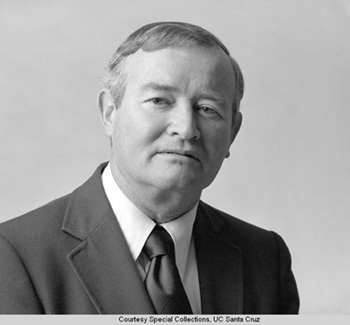Campus News
In Memoriam: Robert E. Garrison (1932–2021)
Robert E. (Bob) Garrison, professor emeritus of ocean sciences, passed away on Friday, November 26, 2021, at his home in Santa Cruz.

Robert E. (Bob) Garrison, professor emeritus of ocean sciences, passed away on Friday, November 26, 2021, at his home in Santa Cruz, in the presence of his wife Jan, son James, and daughter-in-law Alma.
Bob Garrison came to Santa Cruz in 1968 and was one of the original group of six faculty members that established and developed the Earth Sciences Board at UC Santa Cruz and brought it to international prominence. He was an extraordinarily kind and giving person in his encouragement and influence on the development of a large number of UCSC graduate and undergraduate students, researchers, faculty members, and colleagues who have, in turn, gone on to make their own contributions and impacts. Bob and Jan graciously opened their home and hearts and made a long stream of students and visitors feel welcome and appreciated.
Garrison was born in Texas in 1932 during the Great Depression when many people, including his parents, were struggling because of the harsh economic conditions and lack of jobs. Searching for a brighter future, his family had migrated from Indiana to Texas because they had heard of jobs in the oil fields. His father did get a job working for the Texas Oil Company (Texaco) in Saudi Arabia, and after his return the entire family moved to San Francisco, when Bob was still a teenager. He enrolled at Stanford University and graduated in 1955 with a B.S., supporting himself by serving food in a campus dormitory.
It was in a field geology course to the Santa Lucias that Garrison first was exposed to the sedimentary rocks of the Monterey Formation, which was to become the cornerstone of much of his subsequent research career. He stayed on and received a M.S. degree at Stanford in 1958, which was followed by a Fulbright Fellowship to study at the University of Innsbruck in Austria for a year, where he developed an interest in limestones. The year in Europe marked another important point in his life when he met his lifelong partner, Jan.
After the Fulbright, Garrison returned to the states and worked for two years for Sunray DX Oil Company in Wyoming, where he developed an appreciation of the commercial applications of geology.
The 1960s were some of the most exciting years in Garrison’s career and life. He and Jan were married in 1963. From 1961-65 he studied for his Ph.D. at Princeton University under the mentorship of Alfred Fischer, returning for two years of fieldwork in the Austrian Alps and making seminal contributions to our understanding of the Jurassic pelagic limestones and radiolarites there. He spent a year at UC Santa Barbara as an assistant professor in 1965-66, moved north to join the faculty at the University of British Columbia from 1966 to 1968, and returned to California as an associate professor in the new Earth sciences program at UC Santa Cruz.
In 1966, Garrison participated in geologic field training of Apollo astronauts in Oregon, including three who would later walk on the lunar surface. In 1969, he sailed to the northwestern Pacific Ocean as sedimentologist on Leg 6 of the fledgling Deep Sea Drilling Project. He also initiated his work on the siliceous rocks of California’s Monterey Formation, of which he became a foremost expert.
Bob Garrison was an outstanding sedimentologist who made critical contributions to the science through his research, publications, influence on colleagues, and shaping of his many students. He fundamentally changed our understanding of the origin, distribution, and diagenesis of fine-grained marine sediments, most notably the siliceous, calcareous, and phosphatic rocks. He also generated enormous international goodwill, cooperation, integration, and scientific progress with his tireless efforts to involve scientists from all institutions, regions, and countries in the understanding of the sedimentary deposits of the deep sea and continental shelves.
Throughout his career, Garrison consistently addressed fundamental sedimentologic problems in fields that had previously been inadequately addressed because of the lack of appropriate methodology or due to being outside of popular trends in research. His scientific curiosity was guided by his concern for the human condition, and much of his research focused on the origin of the sedimentologic resources of energy and fertilizer necessary for our communal well-being.
Garrison was also a superb and thoughtful teacher at all levels. He helped students develop a broad understanding of the world’s geologic and cultural diversity by bringing his extensive international experience (and never-ending stream of visiting colleagues) into many classes, seminars, and field trips. He was committed to providing opportunities in academia to people who were outside of the traditional pathways, long before it was an explicit goal of the university.
Garrison retired from UCSC in 1994, but continued to travel, carry out research, write, advise students, and organize conferences. His influence on an entire generation of students, collaborations with many national and international colleagues, generosity with his time, and modesty regarding his own accomplishments are hallmarks of Bob Garrison’s life and career.
Donations in memory of Bob Garrison may be made to the Bob Garrison Outstanding Ocean Science Student Award fund.